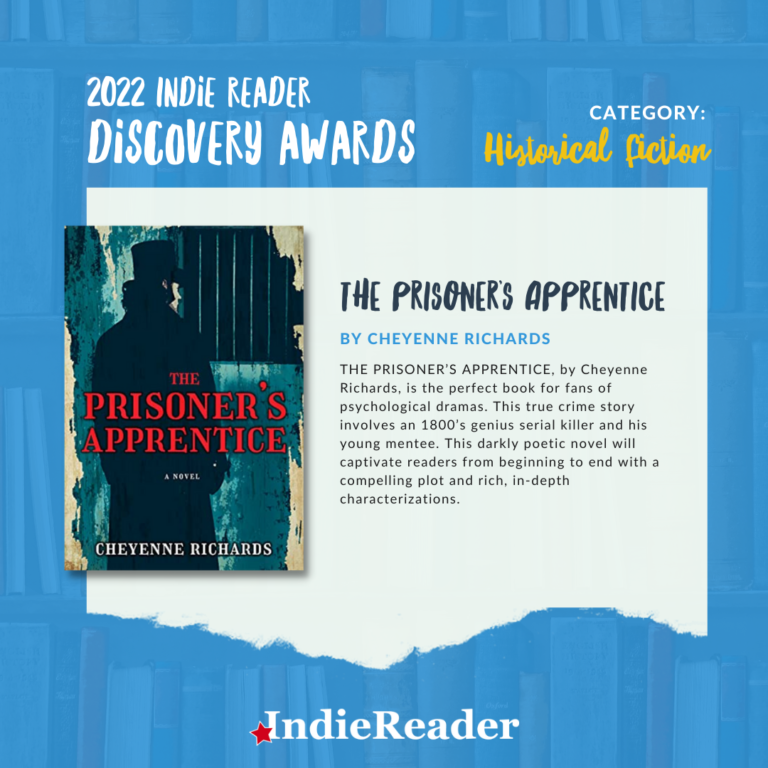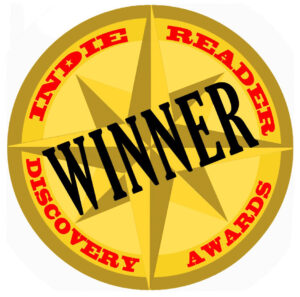The Prisoner’s Apprentice was the winner in the Historical Fiction category of the 2022 IndieReader Discovery Awards, where undiscovered talent meets people with the power to make a difference.
Following find an interview with author Cheyenne Richards.
What is the name of the book and when was it published?
The Prisoner’s Apprentice was published on August 24th, 2021.
What’s the book’s first line?
That sweltering June began like any other. By the Fourth of July, everyone with a boat was out on Cayuga Lake, dragging chains and hooks and fishing nets, looking for bodies.
What’s the book about? Give us the “pitch”.
Albert Jarvis is an unusually bright boy—a tragic temperament for the jailor’s son in a gritty 1840s town at the edge of the American frontier. Desperate to belong, he fails repeatedly to prove himself worth his salt, until a captivating stranger offers an enchanting vision—a world where the path to heroism lies in words.
The place is New York City. The stranger: Edward Rulloff, an accomplished physician, lawyer, professor, inventor, linguist fluent in 27 languages—and serial killer.
Soon caught up in an epic test of loyalty and betrayal, Albert must wrestle with the meaning of justice, and decide for himself whether Rulloff is a genius or a madman—all while trying to survive his thrilling, shameful, and dangerous adventures.
Based on the shocking, true story of the Educated Murderer that riveted the 19th-century world, drove editorials by Mark Twain, and may have inspired Sherlock Holmes’ most notorious nemesis.
What inspired you to write the book? A particular person? An event?
As a fiction writer, I sat down one night to see if I could find inspiration in my family tree for an uplifting historical novel. Instead I found a creepy serial killer and slammed the laptop shut, vowing that was one story I was never going to write in a million years.
Nice try. After reading pretty much every study on genetics and psychopaths, and re-evaluating every unkind thought I’d ever had in a terrifying new context, I found myself enthralled by the same paradoxes that once captured Mark Twain—along with most everyone of his era.
Edward Rulloff was a genius, yet killed people. Why? He spoke 27 languages, yet funded his studies with thievery. Why? He was a narcissist, yet risked his life repeatedly to save one person. Why?
While there’s a wealth of research material about Rulloff’s life and crimes, I found it took a fictional lens—and additional clues from my own family history—to answer that most fundamental question once and for all.
What’s the most distinctive thing about the main character? Who-real or fictional-would you say the character reminds you of?
Sherlock Holmes and Professor Moriarty are two peas in a pod. One focuses on solving crimes and the other on executing them, but both are extraordinary geniuses with deeply troubling dark sides. This duo has many parallels to both the fictional and true Edward Rulloff—something which many scholars have suggested may not be by accident. A young Sir Arthur Conan Doyle may very well have been influenced by the story of the Educated Murderer, down to the unusual size of his head. Edward Rulloff’s brain—once it was liberated from his body and weighed—turned out to be the third largest on record. It still sits in a jar at Cornell University.
What’s the main reason someone should really read this book?
The Prisoner’s Apprentice is a true crime thrill ride that explores fundamental questions of love and loyalty, belonging and acceptance, and a 175 year-old example of cancel culture that has especially relevant implications for today.
If they made your book into a movie, who would you like to see play the main character(s)?
Nearly every reader has suggested Benedict Cumberbatch would make the perfect Rulloff—or perhaps that Edward Rulloff was tailor made for the talents of Cumberbatch. I love the choice because he has such an incredible ability to bring to life all the layers and paradoxes of the most complex characters. It’s just a bonus that there are so many juicy connections to Sherlock Holmes.
When did you first decide to become an author?
I was always that unusual kid—really shy, super curious, and most at home in a library. When I was nine, I chose to spend my summer vacation writing The History of the United States, Beginning with the Explorers. I never got past Sir Francis Drake, and learned this becoming an author thing was going to be harder than I’d expected, but the hook was set. From there, it was a circuitous road, but a consistent one. My career perambulations looked like: writer, geologist, writer, English professor, writer, project manager, writer, marketer, writer, coach, writer.
Is this the first you’ve written?
This is my debut novel, so I’m especially honored to win the Indie Reader Discovery Award.
What do you do for work when you’re not writing?
I am fortunate enough to be able to say that writing is my day job. I also coach writers on how to boost their creativity, build their confidence, and better their consistency.
How much time do you generally spend on your writing?
I usually find 3-4 hours a day is about the maximum amount of solid creative work I can squeeze out of my brain. After that, I usually have to turn to more brainless activities like laundry, email, or taking a walk through the neighborhood.
What’s the best and the hardest part of being an indie?
Balancing the creative and business aspects of writing is the greatest challenge, though I believe the same is pretty much true of all forms of publishing in today’s world.
Would you go traditional if a publisher came calling? If so, why?
I’m very neutral on publishing methods. For me it comes down to a clear balance—is a publisher’s offer compelling enough to give away control and copyright of a work? Over the years, the average answer to that question has been less and less in favor of traditional, but there are a small number of important exceptions. What I love most about Indie is that it pulls the curtain on the Great and Powerful Oz of Publishing, and empowers authors to discover they’ve been wearing the ruby slippers all along.
Is there something in particular that motivates you (fame? fortune?)
My writing has always been driven by curiosity. Why did…? What was it like to…? How would it feel if…? For me, fiction is a way to explore the big questions of life. Forming disparate elements into a coherent narrative helps me make sense of life’s jumble. If such a story can be meaningful to others, I am extremely humbled and grateful for the opportunity to share some of what happens in my head.
Which writer, living or dead, do you most admire?
To me, Orhan Pamuk has done the most amazing job of mapping the nuances of the human heart, while also experimenting with literary convention to produce works that are entirely new, completely challenging, and undeniably worth the effort.
Which book do you wish you could have written?
I’m actually quite happy to discover who I am as a writer—however great or small my contribution—and so am utterly content with the immense pleasure of being a reader of other people’s incredible novels.

